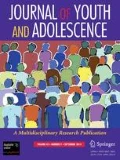Abstract
A family relations model for the study of adolescent egocentrism was tested in an exploratory study of the relationship between parental socialization styles and adolescents' imaginary audience behavior. A sample of adolescent boys (n=58) and girls (n=57) responded to Heilbrun's Parent-Child Interaction Rating Scale and Schaefer's Parent-Behavior Inventory and completed Elkind and Bowen's Imaginary Audience Scale. As hypothesized, rejection-control was associated with increased imaginary audience behavior, while physical affect was negatively related to self-consciousness. Sex differences were noted, with rejection-control being most important in predicting self-consciousness for boys and physical affect being the best predictor of girls' egocentrism behavior. The data provide an alternative model to a cognitive developmental perspective of adolescent egocentrism development.
Similar content being viewed by others
References
Adams, G. R., and Jones, R. M. (1981). Imaginary audience behavior: A validation study.J. Early Adoles. 1: 1–10.
Elkind, D. (1967). Egocentrism in adolescence.Child Dev. 38: 1025–1034.
Elkind, D. (1978).The Child's Reality: Three Developmental Themes, Erlbaum, Hillsdale, N.J.
Elkind, D., and Bowen, R. (1979). Imaginary audience behavior in children and adolescents.Dev. Psychol. 15: 38–44.
Ellis, G. J., Thomas, D. L., and Rollins, B. C. (1976). Measuring parental support: The interrelationship of three measures.J. Marr. Fam. 38: 713–722.
Enright, R., Lapsley, D., and Shukla, D. (1979). Adolescent egocentrism in early and late adolescents.Adolescence 14: 687–695.
Enright, R. D., Shukla, D. G., and Lapsley, D. K. (1980). Adolescent egocentrism-socio-centrism and self-consciousness.J. Youth Adoles. 9: 101–116.
Heilbrun, A. B. (1964). Parent model attributes, nurturant reinforcement and consistency of behavior in adolescents.Child Dev. 35: 151–167.
Kissel, S. (1975). A study in childhood egocentricity.J. Clin. Psychol. 31: 646–648.
Looft, W. R. (1971). Egocentrism and social interaction in adolescence.Adolescence 6: 485–494.
Schaefer, E. (1965). Children's reports of parental behavior: an inventory.Child Dev. 36: 413–424.
Simmons, R. G., & Rosenberg, F. (1975). Sex, sex roles, and self-image.J. Youth Adoles. 4: 229–258.
Simmons, R. G., Rosenberg, F., and Rosenberg, M. (1973). Disturbance in the self-image at adolescence.Am. Sociol. Rev. 38: 553–568.
Steinberg, L. D., and Hill, J. P. (1978). Patterns of family interaction as a function of age, the onset of puberty, and formal thinking.Dev. Psychol. 14: 683–684.
Author information
Authors and Affiliations
Additional information
Research was partially supported through the Western Regional Research Project W-144, Development of Social Competency in Children, with funding in part from the Science and Education Administration/Cooperative Research of USDA, and the Utah State University Agricultural Experiment Station.
Received his M.A. in psychology from the University of Nebraska at Omaha and Ph.D. in human development from the Pennsylvania State University. Current research interest is personality and social development of children and adolescents.
Completed his M.S. Degree in family and human development at Utah State University. Current research interests include the study of interpersonal perception and attraction and human socialization.
Rights and permissions
About this article
Cite this article
Adams, G.R., Jones, R.M. Adolescent egocentrism: Exploration into possible contributions of parent-child relations. J Youth Adolescence 11, 25–31 (1982). https://doi.org/10.1007/BF01537814
Received:
Issue Date:
DOI: https://doi.org/10.1007/BF01537814




